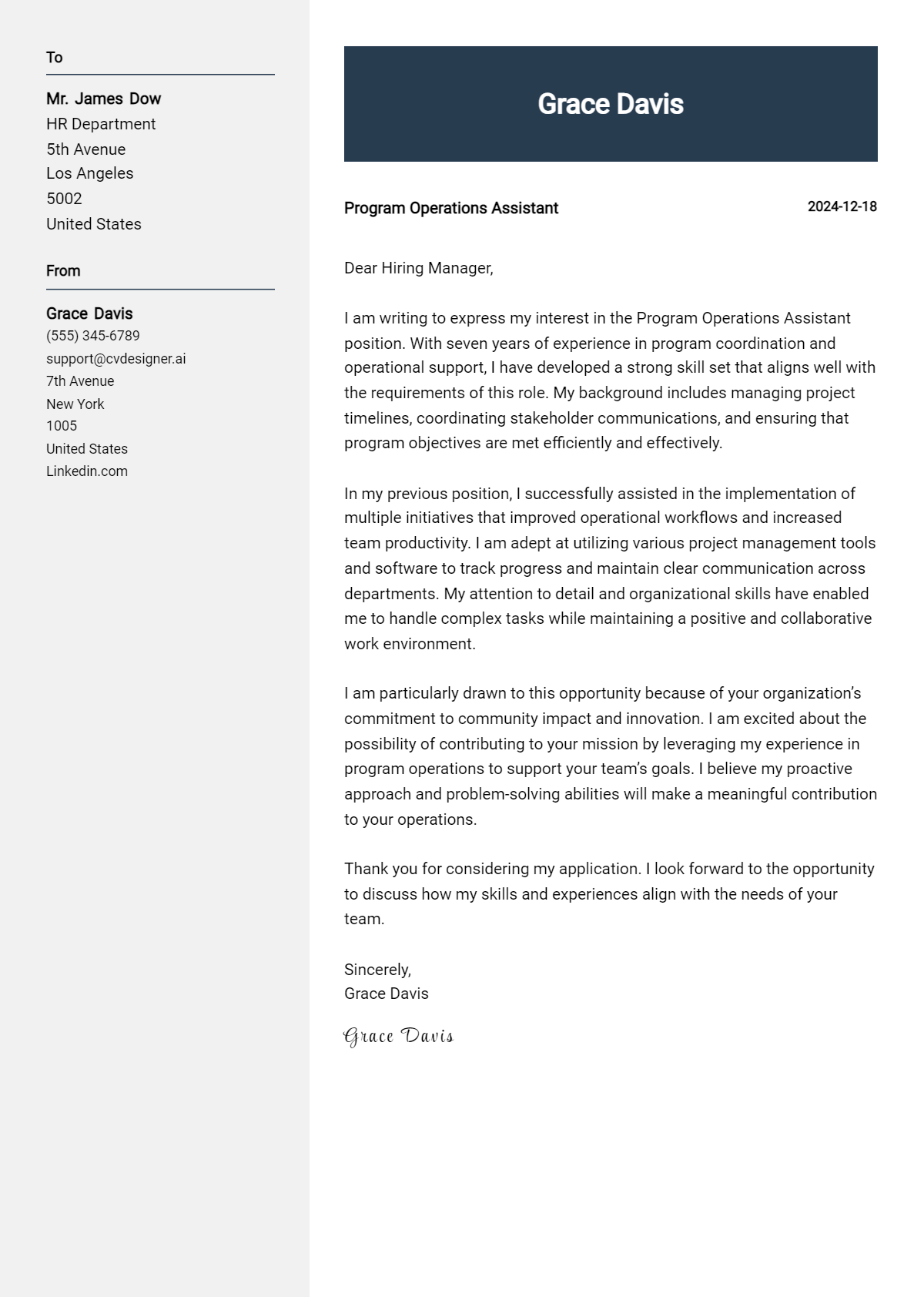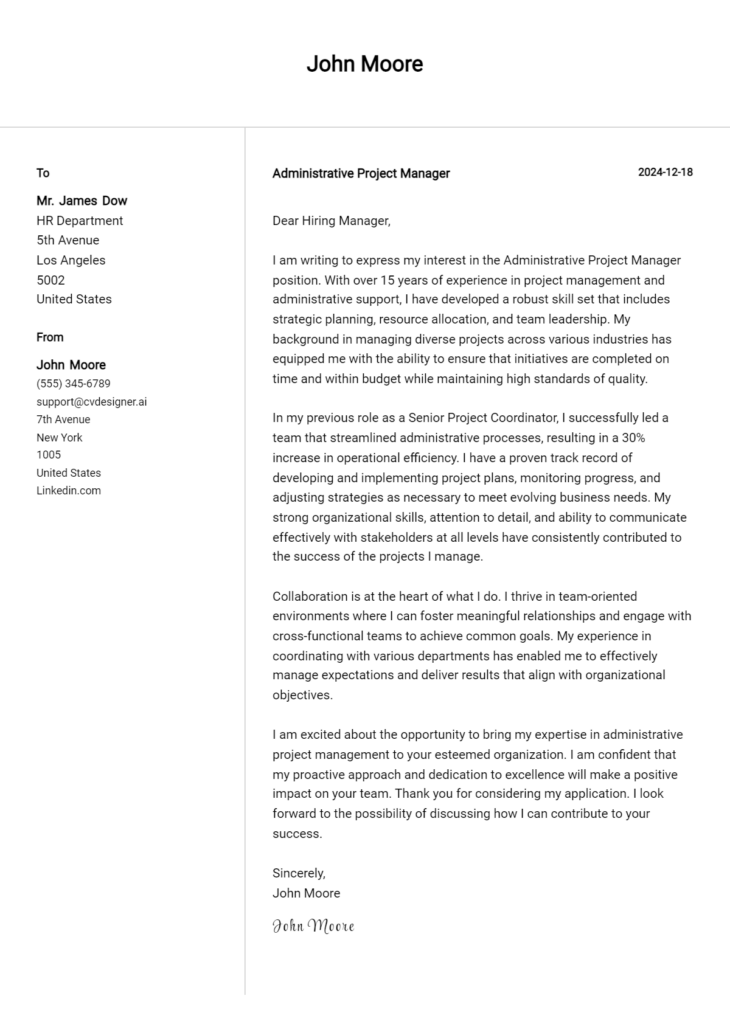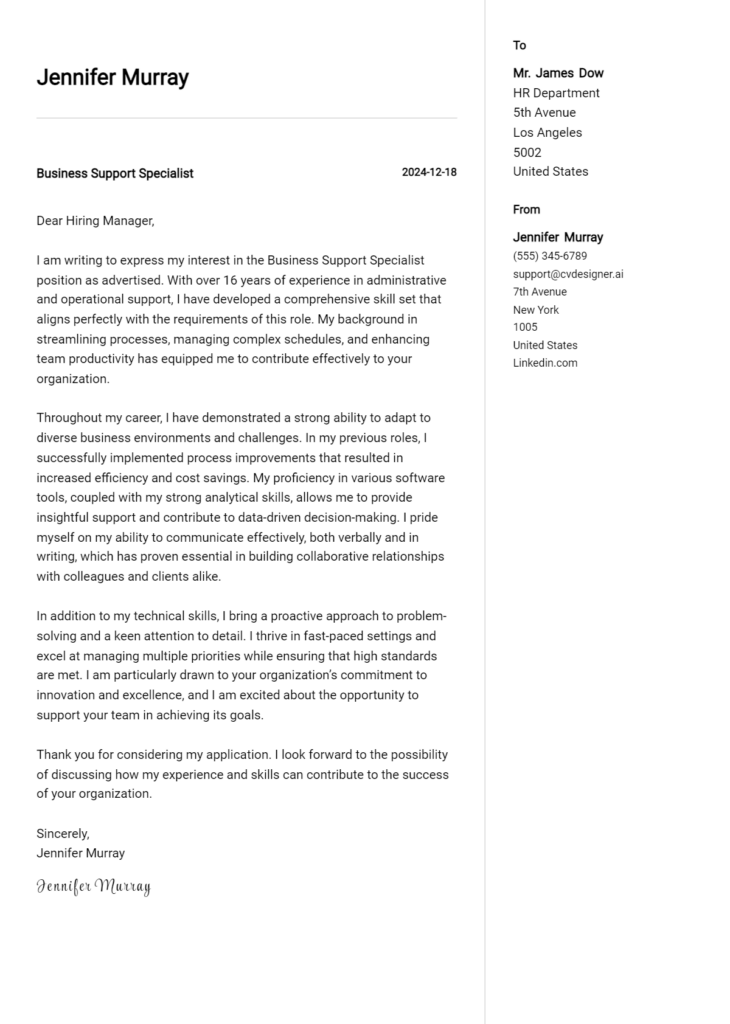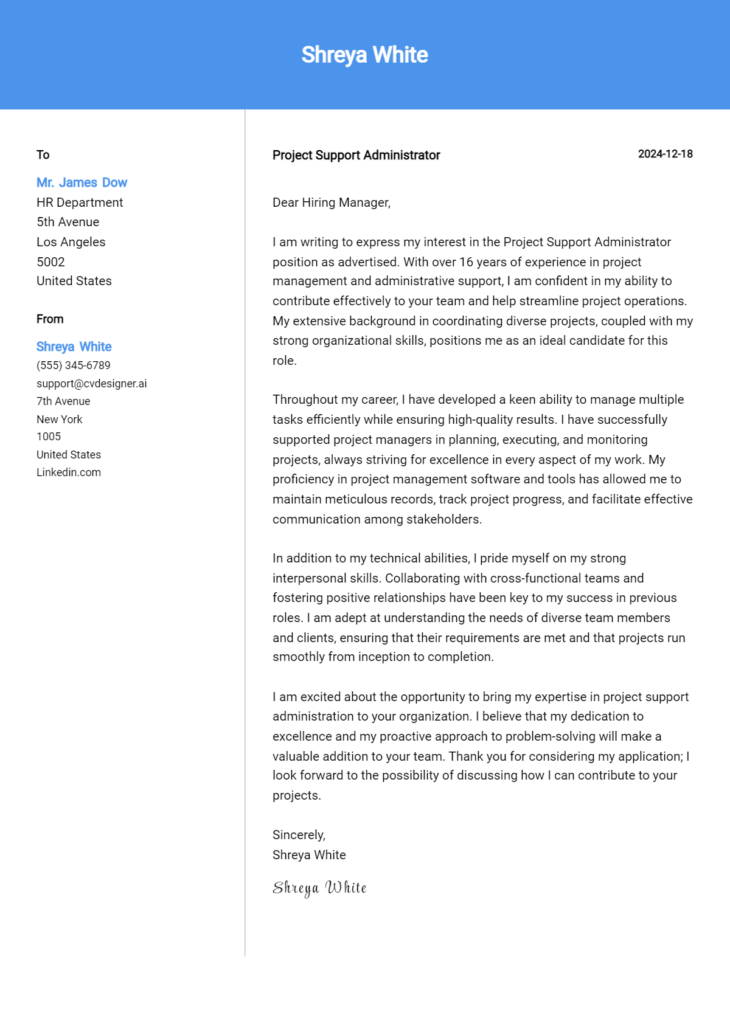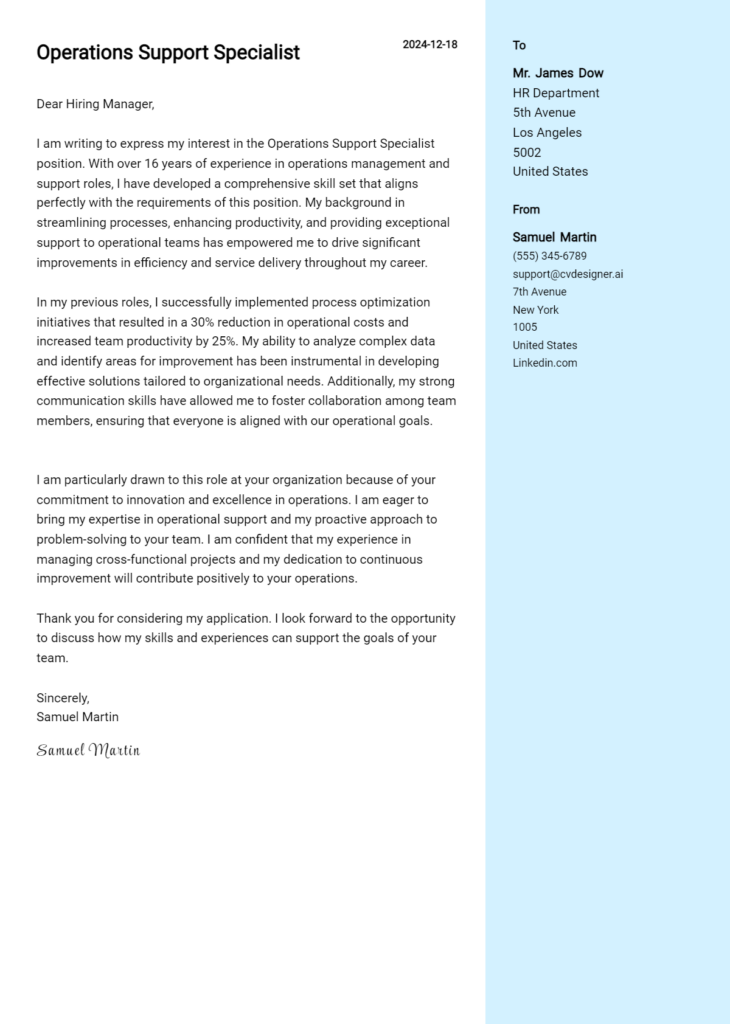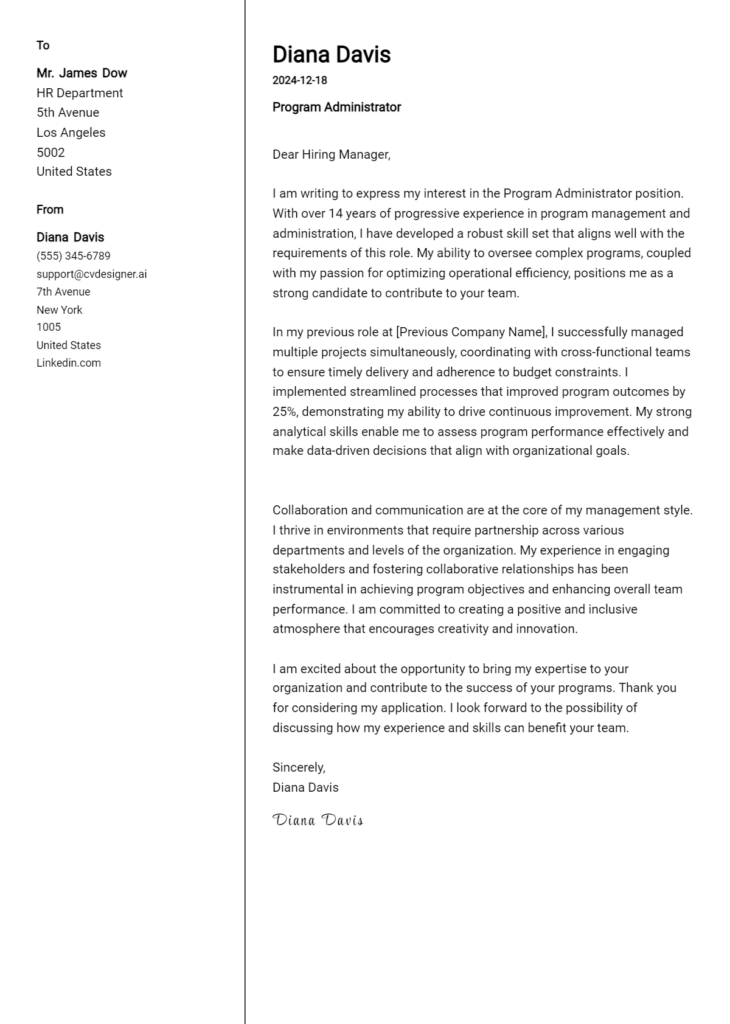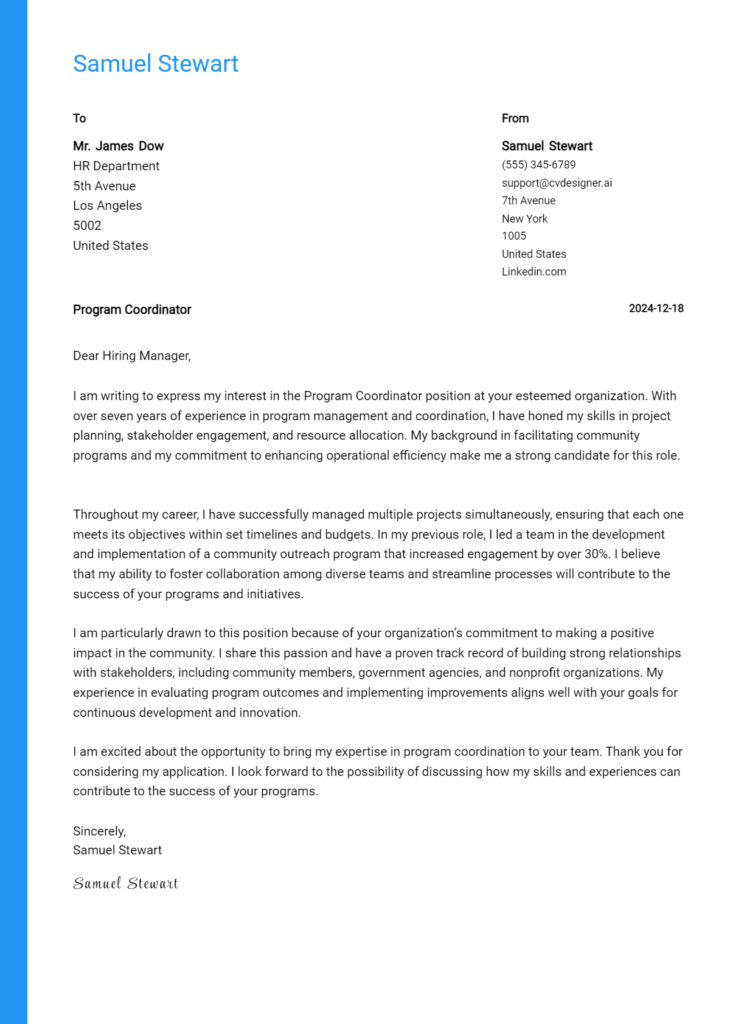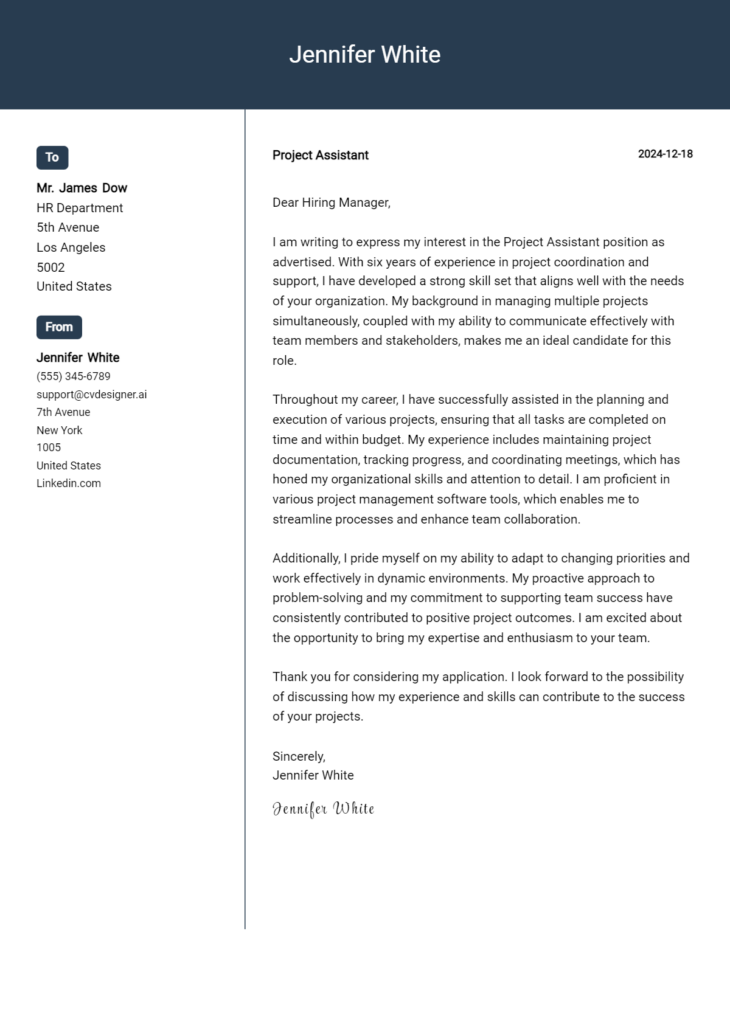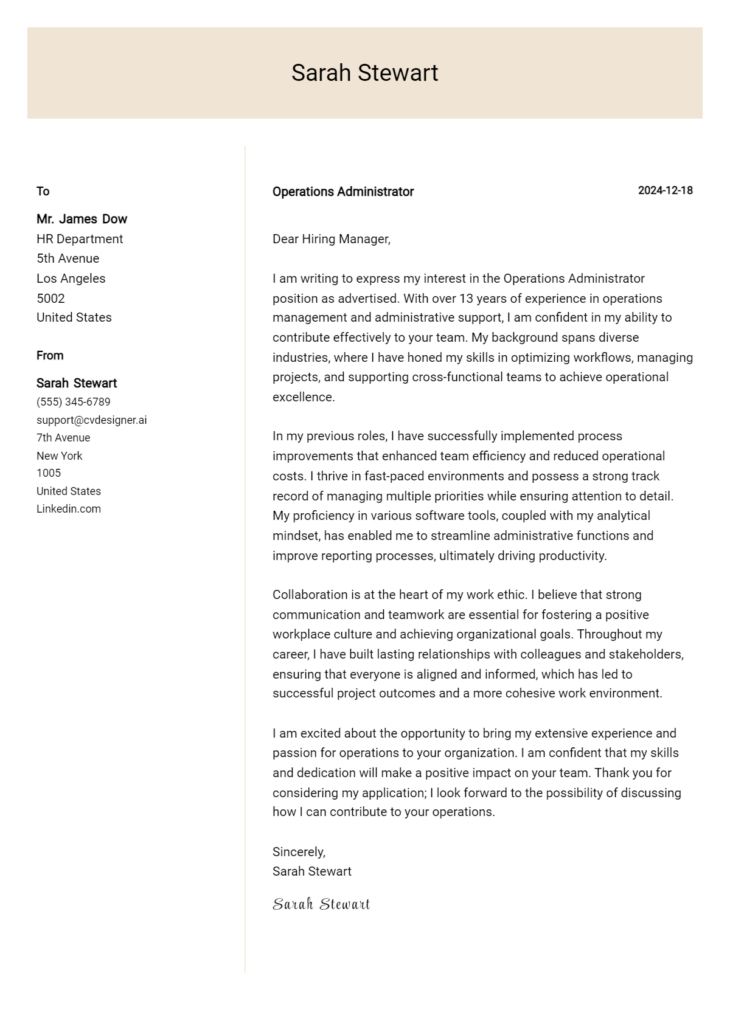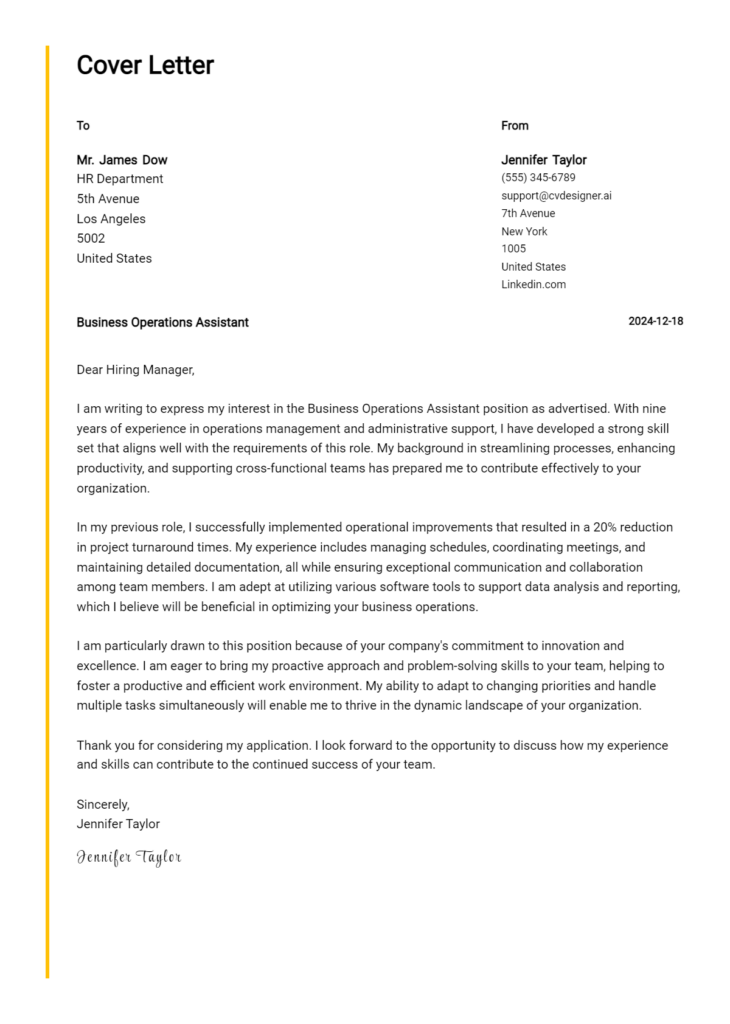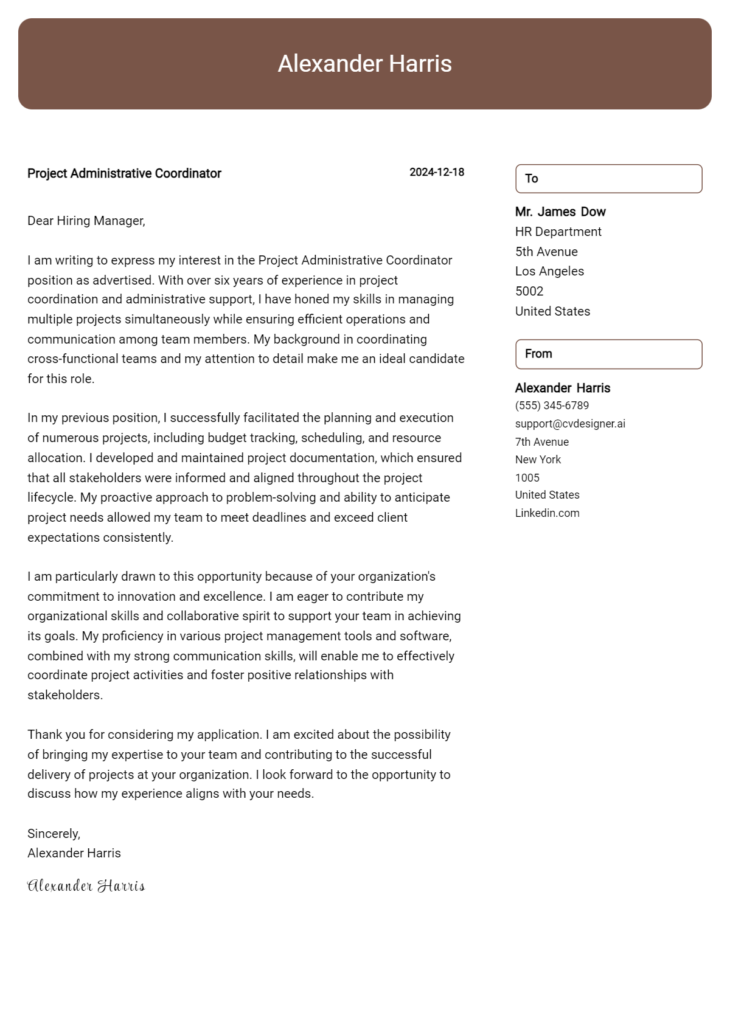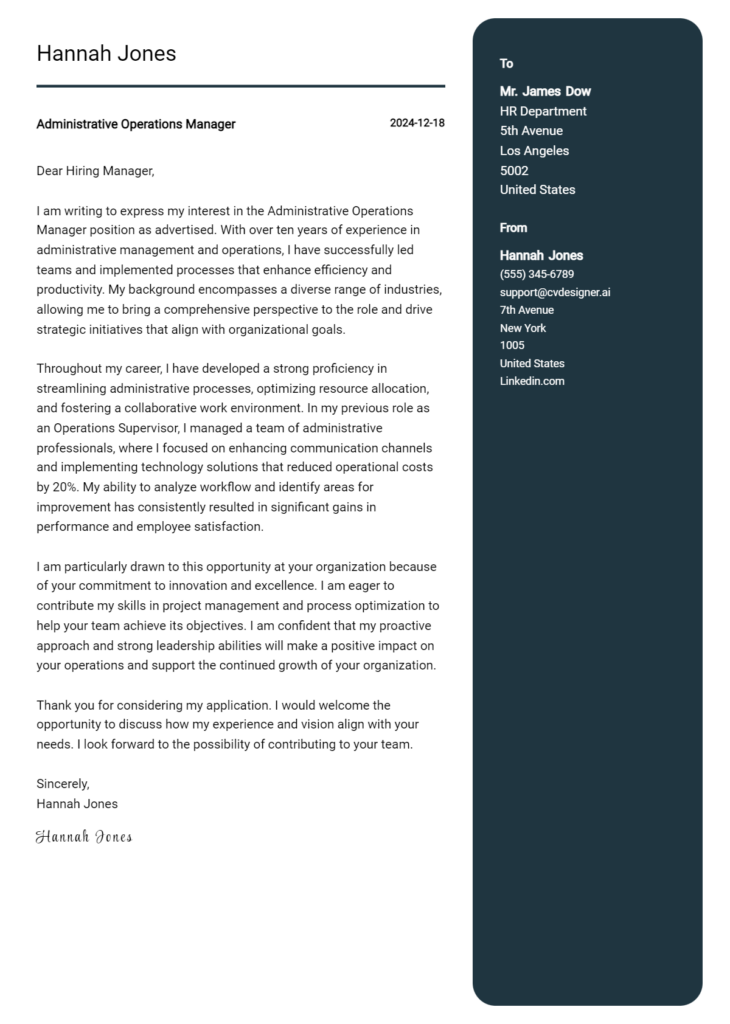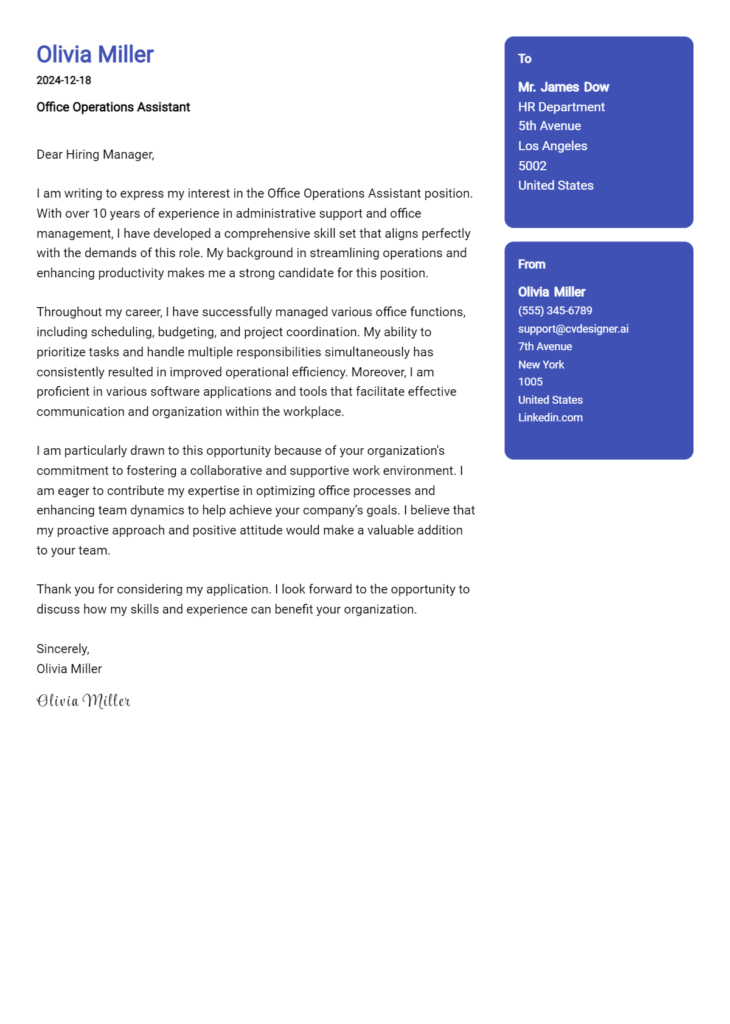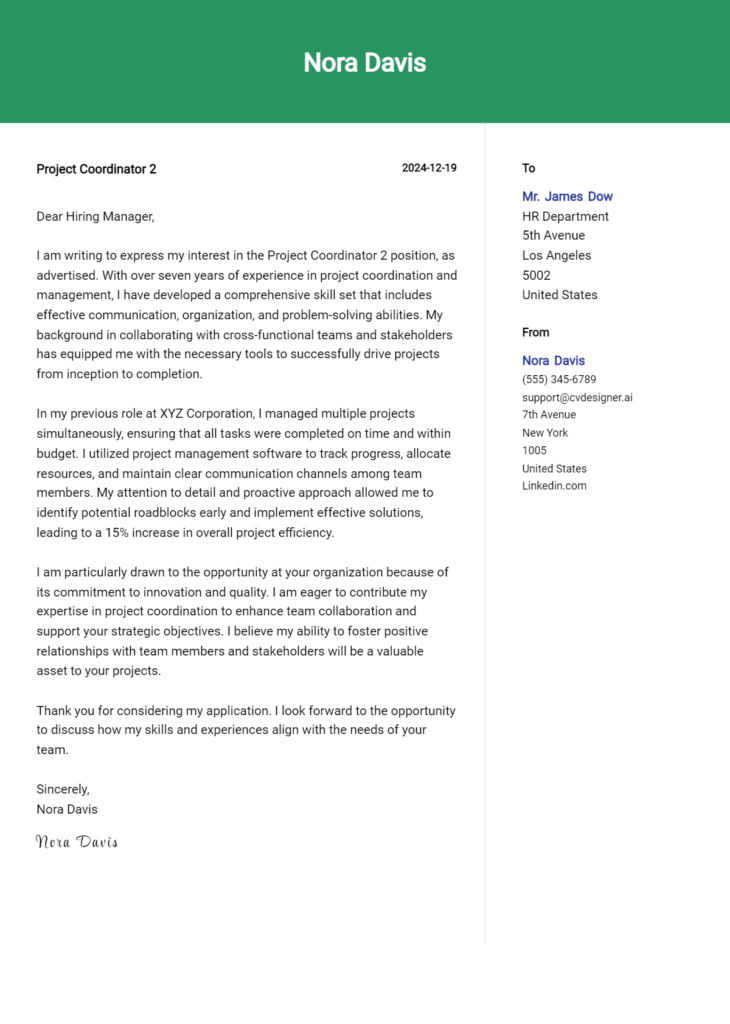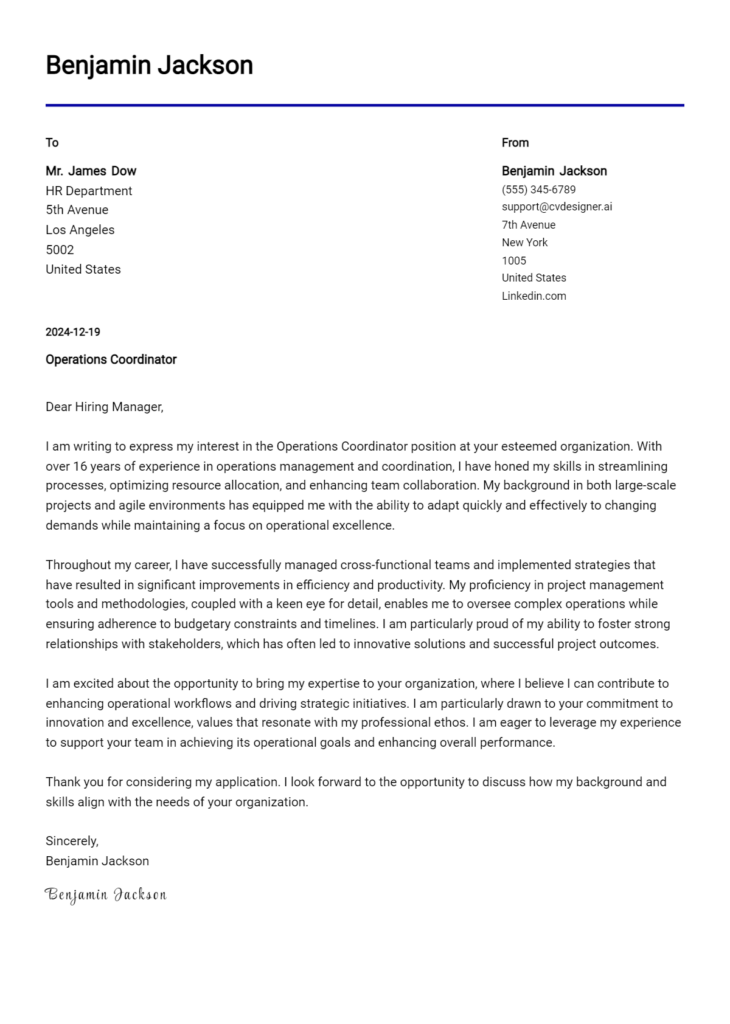Program Operations Assistant Cover Letter Examples
Explore additional Program Operations Assistant cover letter samples and guides and see what works for your level of experience or role.
How to Format a Program Operations Assistant Cover Letter?
Crafting a well-structured cover letter is essential for a Program Operations Assistant, as it sets the stage for your application and introduces your qualifications effectively. The format not only reflects your organizational skills and attention to detail—key attributes in operations management—but also ensures that your message is clear and engaging for the hiring manager. A thoughtfully formatted cover letter can capture attention quickly and demonstrate your professionalism.
In this guide, we will delve into how to structure your cover letter, providing specific insights and examples tailored to the Program Operations Assistant role.
We will focus on the essential components of a professional cover letter, including:
- Cover Letter Header
- Cover Letter Greeting
- Cover Letter Introduction
- Cover Letter Body
- Cover Letter Closing
Each section plays a crucial role in showcasing your abilities and highlighting your fit for the position. Let’s explore each part in detail to help you create a standout cover letter that paves the way for your success.
Importance of the Cover Letter Header for a Program Operations Assistant
The cover letter header is a crucial component of any job application, particularly for a Program Operations Assistant role. It sets the tone for the entire document and provides essential information at a glance. A well-structured header should include your contact information, the date, and the recipient's details. This not only ensures clarity but also projects a sense of professionalism, which is vital in operational roles where attention to detail and organization are key.
A strong header conveys that you are serious about the position and have taken the time to present yourself in a polished manner. In contrast, a weak header can lead to confusion or a lack of professionalism, potentially diminishing your chances of making a positive first impression.
Strong Example
Jane Doe 123 Main Street City, State, Zip jane.doe@email.com (123) 456-7890 October 1, 2023 Hiring Manager XYZ Company 456 Business Rd. City, State, Zip
Weak Example
jane doe email: jane.doe@email.com 10/1/23 xyz company
The Importance of a Cover Letter Greeting
The greeting of your cover letter is crucial as it sets the tone for the rest of the letter. A well-crafted greeting demonstrates professionalism and shows that you have taken the time to personalize your application. By addressing the hiring manager directly, you create a more engaging and respectful introduction, which can help establish a positive connection from the very beginning. To elevate the impact of your greeting, avoid generic phrases such as "To Whom It May Concern." Instead, invest a few moments in researching the recipient's name, which can often be found on the company's website, LinkedIn, or through a quick phone call to the office. A personalized greeting can make a significant difference in how your application is received.
Strong Greeting Example
Dear Ms. Johnson,
Weak Greeting Example
To Whom It May Concern,
The Importance of a Compelling Cover Letter Introduction for a Program Operations Assistant
A well-crafted cover letter introduction is crucial for a Program Operations Assistant role, as it sets the tone for the entire application. It is essential to capture the hiring manager's attention immediately, expressing genuine interest in the position and highlighting relevant skills or achievements. A strong introduction can differentiate you from other candidates, showcasing your unique qualifications and enthusiasm for contributing to the team. Below are examples of both effective and ineffective introductions.
Strong Example
Dear [Hiring Manager's Name], I am excited to apply for the Program Operations Assistant position at [Company Name], as I am passionate about streamlining processes and enhancing operational efficiency. With over three years of experience in project coordination and a proven track record of successfully managing logistics for multiple initiatives, I am confident in my ability to contribute effectively to your team. My commitment to fostering positive relationships and my attention to detail align perfectly with the values of [Company Name].
Weak Example
To Whom It May Concern, I am writing to apply for the Program Operations Assistant job. I have done various jobs in the past, and I think I might be a good fit. I am not sure what specifically you are looking for, but I am willing to learn and help out in any way I can.
Purpose of the Cover Letter Body for a Program Operations Assistant
The body of a cover letter for a Program Operations Assistant serves as a critical platform for candidates to demonstrate their relevant skills and experiences that align with the needs of the hiring organization. This section allows candidates to highlight specific projects or accomplishments that showcase their ability to contribute effectively to program operations. By detailing how previous experiences have equipped them with problem-solving skills, attention to detail, and the ability to work collaboratively, candidates can clearly articulate their value to the company. A well-crafted cover letter body not only conveys enthusiasm for the position but also builds a compelling case for why the candidate is the best fit for the role.
Strong Example
Dear Hiring Manager, I am excited to apply for the Program Operations Assistant position at XYZ Company. In my previous role at ABC Nonprofit, I successfully coordinated a multi-faceted community outreach program that increased volunteer participation by 40% over six months. My ability to analyze operational workflows led to the implementation of a new tracking system that improved project reporting efficiency by 30%. I am adept at managing schedules, communicating with diverse teams, and ensuring that projects are executed on time and within budget. I believe my proactive approach and commitment to excellence will make a positive impact at XYZ Company.
Weak Example
Dear Hiring Manager, I am writing to apply for the Program Operations Assistant position. I have worked in various administrative roles and have some experience with scheduling and email communication. I think I would be a good fit for the position because I am a hard worker. I enjoy helping people and have been involved in a few projects in the past. I hope to bring my experience to your company.
Importance of Cover Letter Closing for Program Operations Assistant
The closing paragraph of a cover letter is crucial as it serves to succinctly summarize your qualifications, reiterate your enthusiasm for the Program Operations Assistant role, and encourage the next steps in the hiring process. A strong closing leaves a lasting impression, reinforcing your fit for the position and prompting the employer to take action, such as reviewing your resume or scheduling an interview. Conversely, a weak closing can diminish the impact of the entire letter, failing to engage the reader or convey your genuine interest.
Strong Example
Thank you for considering my application for the Program Operations Assistant position. With my extensive background in project coordination and my passion for optimizing operational processes, I am excited about the opportunity to contribute to your team. I look forward to the chance to discuss how my skills and experiences align with your needs. Please feel free to reach out to schedule an interview, or I would be happy to provide any additional information you may need. Thank you for your time and consideration.
Weak Example
I hope you think about my application. I really want the job and I think I could do it. Please look at my resume. Thanks for reading this letter.
Common Mistakes to Avoid in a Program Operations Assistant Cover Letter
Crafting a compelling cover letter is essential for standing out in the competitive job market for a Program Operations Assistant role. Avoiding common pitfalls can significantly enhance your chances of getting noticed by hiring managers. Here are some frequent mistakes and tips on how to steer clear of them:
- Generic Content: Using a one-size-fits-all approach can make your cover letter forgettable. Tailor your letter to the specific job and organization by mentioning relevant skills and experiences.
- Ignoring the Job Description: Failing to reference the job description can lead to missed opportunities. Highlight specific qualifications mentioned in the posting to demonstrate your fit.
- Typos and Grammatical Errors: Mistakes can convey a lack of professionalism. Proofread your letter multiple times and consider using tools like Grammarly for an extra check.
- Excessive Length: A cover letter should be concise. Aim for a one-page format that communicates your skills effectively without overwhelming the reader. Check out this cover letter format for guidance.
- Lack of Enthusiasm: A cover letter should convey genuine interest in the position. Express your enthusiasm for the role and the organization to leave a lasting impression.
- Neglecting to Showcase Achievements: Simply listing duties from previous jobs can be unimpactful. Instead, focus on specific achievements and how they relate to the Program Operations Assistant role.
- Not Providing a Call to Action: Failing to include a closing statement can leave the reader unsure about your intentions. End with a proactive statement about your desire for an interview or a follow-up.
By avoiding these errors, you can create a strong cover letter that effectively showcases your qualifications. For inspiration, explore some cover letter examples to help you get started.
Cover Letter FAQs for Program Operations Assistant
What should I include in my cover letter for a Program Operations Assistant position?
In your cover letter, you should include your relevant skills, experiences, and how they align with the responsibilities of a Program Operations Assistant. Start with a brief introduction, mentioning the position you’re applying for and where you found the job listing. Highlight your organizational skills, attention to detail, and any experience with program management or administrative tasks. Mention specific software or tools you are proficient in, such as project management software or data analysis tools. Conclude by expressing your enthusiasm for the role and the organization, and a call to action, inviting them to discuss your application further.
How can I tailor my cover letter to the specific job description?
To tailor your cover letter, carefully analyze the job description for key responsibilities and required skills. Use these insights to align your experiences with what the employer is seeking. For instance, if the job emphasizes data tracking and reporting, highlight any relevant experience you have in managing databases or generating reports. Use specific examples and quantifiable achievements from your previous roles. Additionally, mention the company’s values or mission and express how your background and professional goals fit within that framework. This personalized approach demonstrates genuine interest and understanding of the role.
How long should my cover letter be for a Program Operations Assistant position?
Your cover letter should typically be one page long, containing three to four paragraphs. Aim for about 250 to 400 words in total. Start with an engaging introduction, followed by a detailed body that outlines your qualifications, relevant experiences, and how they pertain to the Program Operations Assistant role. Avoid lengthy paragraphs; instead, use concise sentences that clearly convey your points. The goal is to provide enough information to pique the employer's interest while leaving them wanting to learn more about you in an interview.
Should I include my salary expectations in my cover letter?
Generally, it is advisable to avoid including salary expectations in your cover letter unless the job posting specifically requests this information. Cover letters primarily serve to showcase your qualifications, enthusiasm, and fit for the role. Discussing salary can detract from the focus of your application and may even limit your negotiating power later. If asked during the interview or if you’re in a later negotiation stage, be prepared to provide a salary range based on your research and industry standards. Keep your cover letter focused on demonstrating your value to the organization.
Build your Cover Letter in minutes
Use an AI-powered cover letter builder and have your letter done in 5 minutes. Just select your template and our software will guide you through the process.

